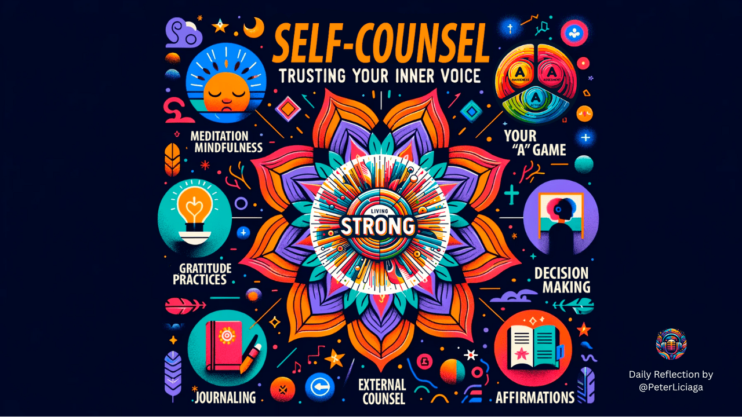In a world saturated with opinions, advice, and external influences, it can be challenging to listen to the most important voice of all – our own. Trusting one’s own counsel, or “gut feeling”, is a foundational aspect of self-empowerment. It’s the inner compass that often knows the path before the mind has had time to rationalize or overthink. But how does one develop trust in their own counsel? Here are some best practices to cultivate this invaluable skill:
1. Meditation:
Meditation is a practice that helps us quiet the external noise and tune into our inner thoughts and feelings. Regular meditation can provide clarity, allowing us to discern our true feelings from fleeting emotions or external pressures. By creating a space of silence, we can hear our inner voice more clearly and trust its guidance.
2. Mindfulness:
Being present in the moment can help us become more attuned to our feelings and reactions. Mindfulness practices, whether it’s mindful eating, walking, or simply breathing, train us to observe our thoughts without judgment. This awareness can help us recognize when our inner counsel is speaking.
3. Gratitude Practices:
By focusing on what we’re thankful for, we shift our mindset from what we lack to what we possess. This positive perspective can boost our confidence and help us trust our decisions. Keeping a gratitude journal or taking a moment each day to acknowledge something you’re grateful for can be transformative.
4. The ‘A’ Game – Awareness, Assessment, Action:
- Awareness: Recognize your feelings, thoughts, and behaviors. Understand what triggers certain reactions in you.
- Assessment: Reflect on these observations. Are your reactions serving you well? What can you learn from them?
- Action: Based on your assessment, take proactive steps to align with your true self. This might mean setting boundaries, seeking new opportunities, or simply resting.
5. Seek External Counsel with Discretion:
While the goal is to trust our own counsel, it’s beneficial to have trusted therapists, counselors, or mentors to communicate with. They can offer perspective, tools, and strategies to enhance our self-awareness and decision-making. However, it’s essential to differentiate between seeking guidance and becoming overly reliant on external validation.
6. Journaling:
Writing down our thoughts and feelings can provide clarity. It’s a way to converse with ourselves, ask probing questions, and reflect on our answers. Over time, patterns may emerge that reveal our deeper beliefs and desires.
7. Practice Decision Making:
Start with small decisions and trust your judgment. The more you practice, the more confident you’ll become in your ability to make larger, more impactful choices.
8. Affirmations:
Positive affirmations can reinforce our belief in ourselves. Create a list of affirmations that resonate with you and recite them daily. Examples include “I trust my intuition” or “I am capable of making the best decisions for myself.”
In conclusion, trusting one’s own counsel is a journey of self-discovery and empowerment. It requires patience, practice, and, above all, a belief in oneself. By integrating the above practices into our daily lives, we can cultivate a strong, trusting relationship with our inner voice and navigate our path with confidence.




